
What is Invoice Financing or Factoring?
Invoice financing, also called Invoice Factoring or invoice discounting, is a form of accounts receivable financing that allows business owners to get quick cash flow from unpaid invoices. Sometimes, overdue or unpaid invoices take 30, 60, or even 90 days to be paid — which can cost your business necessary resources. Invoice financing for small business gives your company the opportunity to get quick funding back into your operation when you sell your invoices through an invoice factoring company for quick short-term financing. Your accounts receivable act as collateral, which means you can get an advance fast.
Invoice financing companies, a boon for entities seeking alternatives to credit card and credit line debt, can propel your company's growth without the stringent requirements that come with a bad credit score or a limited time in business. An invoice factoring arrangement can provide the agility your business needs, offering a cash advance against invoices—akin to a revolving line of credit anchored by your accounts receivable when your operational needs necessitate immediate financial support.
How Can Invoice Financing Help You?
Business-to-business companies that, as a normal course of business, invoice their clients are great candidates for invoice factoring. Accounts receivable can really add up when you have an in balance between invoices that are unpaid versus new business products or services that have to be fulfilled yet cash flow can be tight to completed orders. Day-to-day operations rely on these invoice payments, and when they begin to pile up, your cash flow situation becomes a gray area. That’s where invoice financing loans or receivables financing services come into play.
But how does invoice financing work? Through invoice financing (invoice factoring), you’re able to collateralize invoices in exchange for an advance from an invoice factoring company. The invoice finance company will advance up to 90% of the face value of an invoice for the ability to get cash now. What about the remaining balance? Well, the invoice factoring company holds this amount in reserve. A portion of it will be returned to you, and the rest is subject to invoice financing costs (Factor Fee) and processing fees. These fees are dependent on how long it takes your client to pay and are calculated based on a weekly schedule.
When it’s all said and done, the factoring fee and processing fee are a “convenience fee.” If you need money fast and have unpaid invoices, invoice financing offers a solution you can fall back on. Invoice factoring companies are essentially purchasing your invoices and returning a portion of the return to you for a small fee. The convenience of invoice financing for startups or businesses, and invoice factoring or receivables financing, for that matter, comes down to main factors:
- Invoice factoring is a method of building credit
- Quicker than a short-term loan
- Affordable option versus other traditional financings
- With invoice factoring, you don't accumulate debt like you would if you took out a business loan.
- Accelerates cash flow which improves cash reserves
Why you should consider invoice financing to help your cash flow:
Delayed payments from clients where a customer pays invoices late block up your sales funnel, and increase accounts receivable to uncomfortable levels. We see this issue far too often here at AdvancePoint Capital, which is why we offer some of the best invoice financing services available. As your invoice financing solution, we can offer a different approach to getting paid for your invoices fast. Skip the wait and give invoice financing or accounts receivable financing a try.
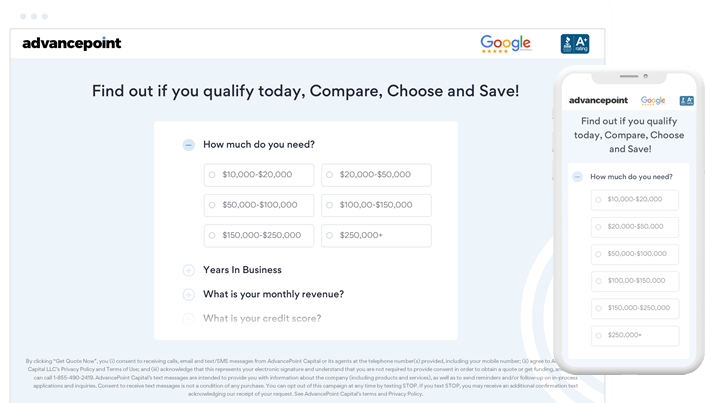
Get Started Today
AdvancePoint Capital makes the loan application process a simple, straightforward experience.
How Does Invoice Financing Work?
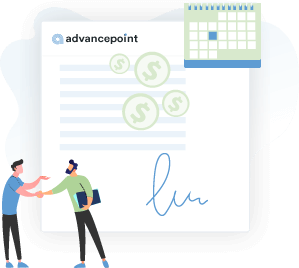
Invoices Are Issued to Clients
The first step in the process is pretty common and simple. An invoice is created for a client based on an order that has been completed, letting the client know how much they owe for the order and when payment is due. The details and terms of the invoice, also known as the “net” terms, can become critical when considering invoice transfers. This is especially important if an invoice remains unpaid and a business has engaged with a non-recourse factor, as the responsibility for covering unpaid invoices shifts to the factoring company.
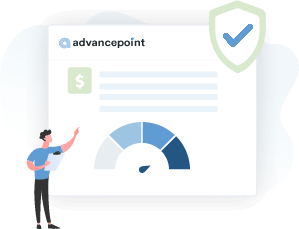
Submit Outstanding Invoices to the Invoice Factoring Company
The invoice is then sent to the invoice factoring company for review, processing, and approval of invoice discounting based on the terms of the invoice financing agreement. This can be done by an online management portal or through a designated email.
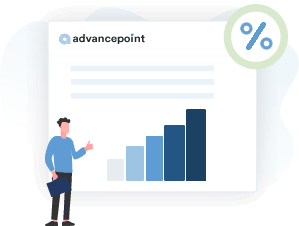
Getting the Advance Payment
Once the invoice factoring company approves the invoice, they will purchase the invoice from the issuer, less a reserve that is established typically 10 to 15% of the invoice, per the financing agreement. The advance payment is the immediate money you get as the company owner of the invoice.
Prepayments are made by ACH via direct deposit to the company owner’s bank account. If you need the money sooner than an ACH, you may ask your financing company to send you the payment via wire transfer, which can be sent the same day to the next day.
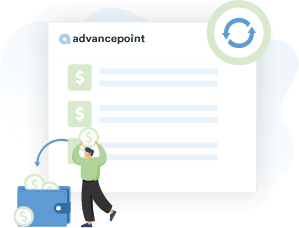
Invoice Factoring Companies Work With Clients for Collection
The invoice factoring company is responsible for the collection of the outstanding invoices submitted. Invoices are payable within a certain period of time, and at some point, the client is required to make the payment to the financing company based on the original net terms. When the client has paid in full, the financing company receives the money, and the invoice is settled with the client.
A schedule of accounts and accountability of all invoices being advanced are usually available with an online portal provided to the customer. Sometimes, smaller invoice financing companies may email the “daily schedule of accounts,” which lists the statement(s) that the company owner “sells” them, the amounts, and the due dates of the invoices.
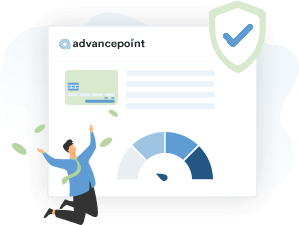
How Businesses Obtain the Balance After Factoring
When the customer pays the bill in full, the company owner receives the remainder of the invoice proceeds (reserves) from the invoice factoring company minus the factor cost and processing fee(s) established in the contractual agreement.
How Factoring Turns Invoices Into Immediate Cash-Funding Invoices
If you could trade your unpaid invoices for instant money, would you? Perhaps you’ve hit a rough patch in your company, which happens all the time. Or, maybe you’re running low on finances. Whether it’s getting started on an upcoming project, handling taxes, or making payroll to pay employees — cash on hand is a crucial part of running a company. If you have outstanding invoices, you’re missing out on the monetary assets you need to keep your operations running smoothly. Invoice financing can give you peace of mind.

Invoice Factoring Rates and Charges
An invoice financing arrangement is a simple method that small business owners like you utilize to tackle bills or immediate costs. There are fewer qualifications required because the risk to the lender is less than alternative loan options. However, there are still fees and restrictions involved with invoice financing services, including transaction fees which can vary depending on the agreement with the factoring company.
This financial solution works through processing and financing fees, along with possible transaction fees such as wire fees, which requires a bit of math to understand. Let’s explore an example of how invoice financing works, while keeping an eye out for various charges, including those transaction fees, which can add up.
Let’s assume that you have a $50,000 invoice with 30-day terms — and how the process works
- The invoice finance company purchases your newly issued invoice of $50,000, and provides the issuer $45,000, while holding the remaining amount, $5,000, in reserve.
- The invoice finance company, since purchasing the invoice then assumes the collection of the invoice from the client under the terms of the invoice, in this case within 30 days.
- Once the invoice is paid, the reserve is released to the issuer less the flat fee and any applicable transaction fees established on the invoice financing agreement. For this case, let's assume a 1% fee, which equals $500, and a wire fee for the transaction, would be deducted from the reserve of $5,000 when returned to the issuer.
- An additional monthly service fee is also charged on many invoice financing agreements. This fee can sometimes incorporate the costs associated with transaction fees, especially in the case of non-recourse factoring agreements.
- This process continues throughout the commitment in the invoice financing agreement.
In our example, you can see how this is a sound option for quick, available funds, especially when your company is strapped for resources in the short term. However, if you’re looking ahead to the future and see better finances on the horizon, this is a great way to mitigate immediate financial concerns for your small business , while still being mindful of the various costs involved. When comparing factoring companies, be sure to understand all their fees, including transaction fees. It's essential to request detailed information about all the fees they charge to avoid any surprises.
Overall, the knowledge of these charges allows for a well-informed decision, enabling you to choose a service that aligns with your business's financial strategies and needs.
Is Invoice Factoring Worth the Expense?
The answer to this question depends on your company. If you’re in need of a quick cash advance for your enterprise, invoice financing may be the best option due to the relatively low cost you have to pay.
The cost of invoice factoring is quite reasonable with factor costs of only 1% to 3% of the face value of an invoice as a cost, making it an affordable, sound, short-term financing option.
Really, it comes down to weighing the pros and cons of the invoice financing cost for your business’s current financial circumstances. Invoice financing is a fast way to accelerate payment of your receivables to save your cash flow. Not all invoice financing companies are equal. A little research and help from Advancepoint to find the right invoice factoring company can make all the difference in the world. Let Advancepoint provide invoice financing for your business.
Features of Invoice Financing
Accounts receivable financing has a lot of unique benefits and features that small business owners can take advantage of for their company. This financial solution removes the painstaking process of waiting for payments because these outstanding invoices act as collateral for future cash flow. The good news is the approval is based on your client's credit history and not that of the issuer of the invoice, which provides a funding solution for business owners who have credit history challenges that could exclude them from receiving traditional business loans or lines of credit.
The invoice factoring company is tasked with managing collecting payment from the client or customer, which means you don’t have to worry about collecting payment yourself. It’s a simple and flexible option for small business owners looking for an ideal quick-fix funding solution for their businesses.
In as little as one business day, you can have the pre-payment in your bank account and use it for cash flow issues, working capital, renovations, or whatever your company needs.
How Much Does Invoice Financing Cost?
The invoice financing cost typically includes the discount and service fees. The discount fee is a percentage of the invoice amount that the invoice factoring company charges as their fee for providing the financing upfront. The volume of invoices usually calculates this fee on a monthly basis. On the other hand, the service fee is a fixed fee or a percentage of the invoice amount that covers administrative and processing costs associated with the financing arrangement. The rates for these fees vary depending on the invoice factoring company, the invoice amount, and the creditworthiness of the client being invoiced, but they generally range from 1% to 3% for the discount fee and can be a monthly or annual fee for the service fee.
The fast, convenient, and straightforward way to get the funds you need for your business – now
Get your quote today by filling out our simple online form.
What Are the Qualifications of Invoice Financing?
It’s simple to qualify for invoice financing. Any company that has a B2B model with outstanding receivables can qualify for invoice financing. This financing opportunity is far different than the majority of advances and loans because it doesn’t rely on the business owner’s revenue, time in business, profits, or personal credit history. So, it’s perfect for small businesses struggling with bad credit issues or that just started up and don’t necessarily have the years in the industry to receive traditional business loans, lines of credit, or other funding.
Invoice financing companies are not nearly as concerned with traditional qualifications. Instead, they take a deep look at the client you are invoicing because it is the client's credibility they will use to advance cash to your company. If you’re curious about the amount you’re able to qualify for with invoice financing, the advance maximum is based on the invoice financing agreement.
Generally speaking, an invoice financing company will look for an average monthly account receivable ledger of around $50,000 from the company owner to the invoice factor. However, depending on the invoice factoring company, exceptions can be made to account for a wide range of variables.
The best Invoice Financing companies will take an in-depth look at the credit worthiness of the client that is on the invoice rather than the company owner who is receiving the advance. The invoice financing company is far more concerned with the credit of who is on the bill that they have to collect from because they are the ones making the payment to the invoice financing funder.
What is Required to Apply for Invoice Financing?
Because invoice financing options offer such a unique methodology, they are actually easier to apply and qualify for. Since the collateral is in invoices rather than in assets of the company owner, the person paying back the lender is responsible for creditworthiness and other qualifications. To apply for invoice financing and eventually get approved, you must provide the following:
Document Requirements
- One page application
- List of names of businesses and contact info you are invoicing
- Accounts receivable ledger
- Actual invoices and their terms
Eligibility Requirements
- Good credit history from the client being invoiced
- Quality A/R and A/P reports
- At least $25,000 in monthly invoice volume
- No credit checks for business owners who is looking for invoice financing required
Core Characteristics
- A line of credit up to $5 Million
- Invoice Value advanced up to 90%
- Invoices accepted with "net" terms of up 90 days
If you need money fast and don’t want to deal with the complex issues plaguing alternative forms of financing, invoice financing options are a great way to get the money you need for your small business now. Fill out our simple form today.

Get Started Today
AdvancePoint Capital makes the loan application process a simple, straightforward experience.
Approved for Invoice Factoring Loan — What’s Next?
Once you’re approved for invoice financing, you will get a “Letter of Intent” or an “Approval Terms Disclosure.” These documents describe the terms and fees of the financing relationship and are important statements you should know about.
The following items may be covered in the Letter of Intent or Approved Terms Disclosure:
Maximum Advance Amount
The maximum advance amount is the purchase price of the invoice from the invoice factoring company, less the reserve amount, which is established in the invoice factoring agreement.
Minimum Fee
A percentage of the maximum advances per month. This is only charged if the monthly minimum fee is greater than the fees actually paid. (This fee is typically 1%.)
Advance Rate
The advance rate, also known as the reserve percentage, is the percentage of the face value of the invoice held in reserves by the invoice finance company until the client pays the invoice. Agreement range in this percentage that is held in reserve.
Audit
Invoice financing companies may require audits from time to time, in which clients agree to pay finance companies for all reasonable out-of-pocket expenses for performing such an audit.
Services Offered
This details the receivable management services and responsibilities of the invoice financing company. Services offered describe the management systems and collection process as well as the payment processes of the finance agreement.
Contract (Agreement) Term
Lists the term of the agreement or contract—usually six months to one year.
Service Fees
A service fee may be charged by the invoice factor monthly to help defray the operational costs of processing invoices. This would be in addition to a factor rate with the face amount of each purchased invoice. Fees range from .5% or more depending on invoice volumes processed.
Collateral
Usually, a first priority perfected security interest in clients’ accounts, invoices, chattel paper, contract rights, general intangibles, books, and records, and all proceeds of the foregoing is required.
Due Diligence Fee
This non-refundable documentation and due diligence fee may be charged to a client at the time of acceptance of the proposal or offer. It is not always charged but is usually between $250 and $500.
Other Conditions
Any other conditions that might affect the agreement.
Guarantees
The business owner(s) should expect personal guaranty from the principal shareholder(s); Corporate guarantees from any parent entity and all wholly-owned subsidiaries, if applicable. Nonrecourse invoice factoring,
Additional Key Features of Invoice Financing
- Invoice size from $5k to $1 million
- The advance rate is 80%- 90%
- Pricing depends on volume (for example $2 million volume, we can price it at 1. 5% for 30 days, 2% for 45 days, and 2.5% for 60 days)
- Pricing is 1% to 3% depending on the risk
- Most of our financing facilities are non-recourse financing, allowing peace of mind that you won’t be held responsible if your clients fail to pay.
- However, opting for recourse factoring can benefit healthier companies, ensuring a lower cost of capital due to the decrease in the factor's risk.
- We can work with IRS tax issues, poor credit, etc.
- Terms can go out 120 days and exceptions to 150 in some cases, making our financing flexible to your business cycle. It's crucial to set a realistic factoring period that aligns with your client's payment capabilities, especially in a recourse contract.
Regardless of the invoice amount, you can get the money you need in a pinch for renovations, working capital, and more with AdvancePoint Capital’s invoice factoring. For those that have had difficulties obtaining other types of business loan products, invoice financing could be a perfect option.




